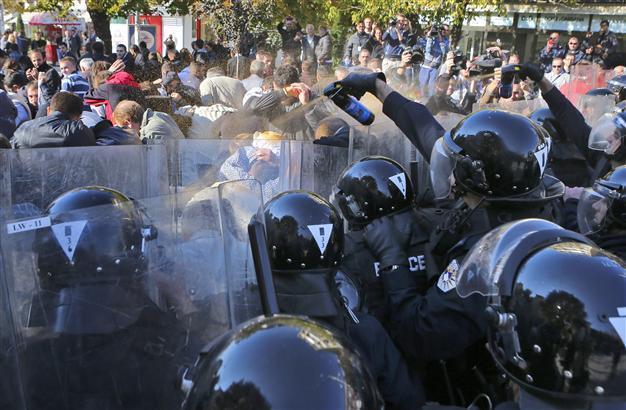Clashes at Kosovo protest against new talks with Serbia
PRISTINA - Agence France-Presse

EPA photo
Almost two dozen people were wounded today when Kosovo police clashed with hundreds of demonstrators protesting the relaunch of EU-brokered talks between Kosovo and Serbia.
Police said they were "forced to intervene" after several hours of a tense stand-off with protesters occasionally throwing stones while police used pepper spray to drive the crowd back from government headquarters in central Pristina.
Police said 18 officers and four protesters were wounded and that they had arrested 26 members of the Self-determination Movement -- Kosovo's third biggest political party which organised the protest -- including several members of parliament.
The lawmakers were released after they identified themselves.
The nationalist Self-determination Movement opposes all talks with long-time foe Serbia.
After a long pause following Serbian elections in May, the prime ministers of Serbia and Kosovo, Ivica Dacic and Hashim Thaci, met in Brussels on Friday as a first step to restarting talks aimed at normalising relations and easing tensions in the Balkan region.
"We are protesting against the meeting between Thaci and Dacic, against the political dialogue... Serbia is an abnormal state and we don't want to 'normalise' our relations," Self-Determination leader Albin Kurti told AFP.
He accused Thaci of "pardoning and rehabilitating Serbia and thus allowing (Belgrade) to continue its path towards the European Union. This Monday cannot be a normal working day for the government after what happened Friday." Serbia is an EU candidate member and Kosovo hopes to formalise ties with the bloc, but Brussels has made clear to both that they must resume talks and show concrete results.
Kosovo, which unilaterally declared independence in 2008, is recognised by some 90 states including 22 of the EU's 27 members, the United States and Turkey. Belgrade and the Serb minority in Kosovo still consider the territory a southern Serbian province.
